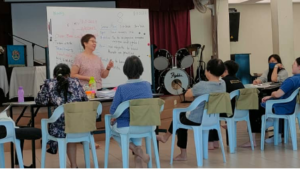In September 2020, the United Nations High Commissioner for Refugees (UNHCR) in Malaysia approached ElShaddai to collaborate on a shelter project for refugee women and children at risk. When this invitation was extended to us, we saw this as an opportunity to grow as an organization in our capacity to better serve the refugee community in Klang Valley.
With this shelter project, we seek to provide protection, rehabilitation, and self-development opportunities to refugee single mothers, women, and boys and girls under the age of 18, who are suffering from sexual and gender-based violence (SGBV) and other risks, which include eviction due to financial struggle, homelessness, child or forced marriages, as well as domestic abuse and sexual violence.
We have two shelter homes: one for women and girls, and one for boys. Our main shelter personnel consist of two house guardians for each shelter, caseworkers, project coordinator, and volunteers. From September 2020 to June 2021, we have taken in refugee women, boys and girls from Myanmar, Afghanistan, India, Somalia, South Sudan and Iran.
The primary services that ElShaddai is able to provide to our residents include education, a safe placement, basic needs, psychosocial support, skill-training (air-con servicing, soap-making) and extracurricular activities. We also seek external services from other organizations such as Health Equity Initiatives (HEI), Women’s Aid Organisation (WAO), and Buddhist Tzuchi Free Clinic for mental health support and healthcare needs.




A typical day of our shelter boys and girls may look something like this: going and coming back from school, doing homework, after-school extra classes taught by volunteers, a short nap, exercise and sports, dancing to K-pop bands in front of the TV, listening to music, cooking, cleaning, fellowship time, and bedtime. At our shelters, we are constantly looking for opportunities that will enrich the lives of the residents. Recently, we have just started a weekly online art therapy session at our boys shelter with a Singaporean volunteer. For mothers, apart from taking care of their babies, they are also engaged in online English classes with volunteers, hobbies, and fellowship time. On weekends, both shelters visit the park together, play badminton, and have occasional outings to waterfalls. Unfortunately, due to the current FMCO restrictions, we are not able to go for outdoor activities, but our house guardians and residents constantly find creative ways to keep themselves occupied during this time.
As a shelter caseworker, my responsibilities include being the focal contact for referrals from various NGOs and the UNHCR, and then carrying out the case management process, starting from the initial screening, intake of the person or family of concern, and carrying out relevant interventions, with a mutual end goal with the person of concern to either re-integrate them back into their communities or to be self-sustainable, once their risks are alleviated or minimized.
I am incredibly grateful to have embarked on this humble journey of both giving and receiving from all the residents at the shelters. To be honest, this role is not an easy task, as I am at the forefront of witnessing and experiencing the ugliest parts of human nature in the form of violence perpetrated against these people of concern. On some days, it gets emotionally heavy and overwhelming.



To be honest, this role is not an easy task, as I am at the forefront of witnessing and experiencing the ugliest parts of human nature in the form of violence perpetrated against these people of concern.
Despite our limitations and weaknesses, we hope to do the best we can for the best interest of the residents of the shelter.


However, there is something stronger than these atrocities. It is their strength in overcoming challenges, their will to survive. It is the decision to not let the past define who they are, and the courage to move forward with the brightest smiles. Each of the residents at the shelters have their own strengths. If given the opportunity and resources, they will be empowered to discover their own potential and grow in their strengths, be it drawing, sewing, dancing, mathematics, or even qualities like being a good listener, hard worker, and leader.
Apart from that, I have been blessed with the opportunity to have witnessed the growth of this shelter project from its launching in September last year up to this point. With the right vision and purpose, we agreed on this collaboration and started this project even though not all of our team workers have prior skills or experiences in running a shelter and conducting case management for unaccompanied children at risk and women at risk. We have been through many hardships and many joys. Despite our limitations and weaknesses, we hope to do the best we can for the best interest of the residents of the shelter. With God as our ultimate guide and strength, the teamwork of our co-workers and leaders, we strive to be a safe space for healing and growing, to learn, to fall, and to get back up again.










